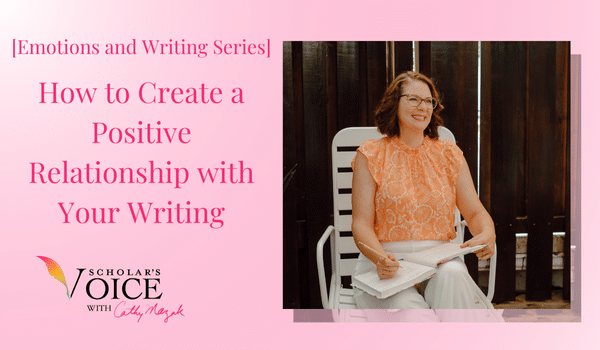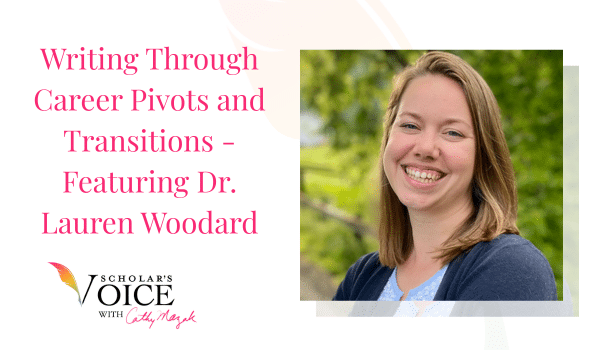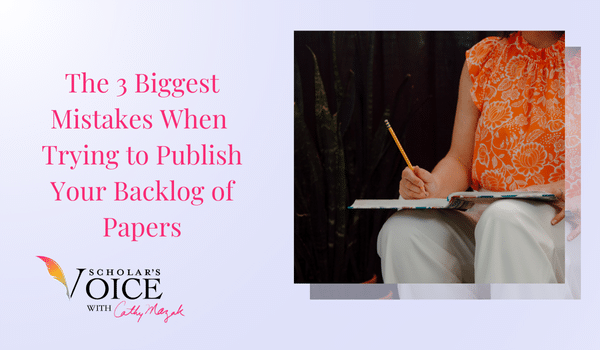[Emotions And Writing Series] How To Create A Positive Relationship With Your Writing [RE-RELEASE EP 5]

Today’s episode is a re-release of episode 5 of the podcast.
Do you feel excited, happy, and encouraged when you think about writing? Or do you feel guilty, sad, and overwhelmed? Creating a good relationship with your writing doesn’t happen by accident. The secret to writing and publishing more is turning your writing practice into a joyful and positive experience.
MORE DETAILS
As part of the Emotions and Writing podcast series, I’ve chosen to rerelease an earlier segment that explores behaviors that can foster a positive relationship with writing. Throughout the Emotions and Writing series, I’ve highlighted the detrimental effects of negative emotions on writing, such as guilt, overwhelm, and grief. Today, I’m excited to share strategies that can reignite positive feelings about academic writing and your writing practice, offering you the potential for a transformative shift in your relationship with writing.
Tune in to learn three behaviors that lead to a positive relationship with writing. I’ll guide you on how to adopt each of these behaviors into your writing and how to unlearn some negative habits. This will empower you to reprogram your mindset and establish a positive, sustainable relationship with writing.
3 Behaviors to Create a Positive Relationship with Writing
- Start with small wins. If you feel unable to write, don’t suddenly try to force yourself to write 8 hours a day. Instead, write with focus. Start with one hour, one day per week. Listen to episode 2 of the podcast for more information on identifying your Soaring State™ (previously called Tiger Time).
- Reward yourself. Create a manageable reward system for yourself. The reward can be as small as a gold star sticker or as grand as a celebratory dinner out. Rewarding yourself is a form of positive feedback that will motivate you.
- Adjust your mindset. We all struggle with guilt, overwhelm, and imposter syndrome as professors. There is so much pressure on writing and publishing in academia and virtually no training on how to write. Instead of looking at writing as a looming obligation, consider it a way to get your message and academic mission out to the world.
Unlearn and Relearn How to Write
Your writing mindset is entirely psychological. Academia makes you forget how to write, and the constant pressure and peer critique have you questioning your ability to write. Here is a three-step framework to help you adjust your mindset about writing.
- Identify the stories you tell yourself about your writing. Examples of these internal messages/harmful self-talk are: I am not smart enough to write this paper. I am not a good writer.
- Flip the script on your writing stories. Write down the exact opposite of each message you wrote in step 1.
- Reprogram your mindset by changing your default thoughts. Repeat the positive version of your writing stories and choose a mantra you can use to push away negative self-talk.
“Unlearning your writing practice is completely psychological. It is all about mindset. It involves mental work and commitment on your part, but it is so worth it. If academia has made you forget how to write or the point of writing making you not want to do that anymore, that’s a problem because you have a unique perspective on your field that needs to get out there.”
“This idea of writing and publication as a gatekeeper is overwhelming and awful. We have to actively learn to reprogram our negative writing stories so that we can get our big message out into the world. Positive interactions and feeling good about your writing must be actively created and fostered by you.”
We’ve opened the waitlist for our next cohort of Navigate: Your Writing Roadmap®. Check out the program details and get on the waitlist here.
CONTINUE THE CONVERSATION:
- Our 12-week Navigate: Your Writing Roadmap® program helps tenure-track womxn and nonbinary professors to publish their backlog of papers so that their voice can have the impact they know is possible. Get on the waitlist here!
- Cathy’s book, Making Time to Write: How to Resist the Patriarchy and Take Control of Your Academic Career Through Writing is available in print! Learn how to build your career around your writing practice while shattering the myths of writing every day, accountability, and motivation, doing mindset work that’s going to reshape your writing,and changing academic culture one womxn and nonbinary professor at a time. Get your print copy today or order it for a friend here!
- Want to train with us for free on your campus? Now you can when you recommend our Scholar’s Voice™ Faculty Retreats to a decision-maker on your campus! Download the brochure with the retreat curriculum and both in-person and online retreat options here.
- If you would like to hear more from Cathy for free, please subscribe to the weekly newsletter, In the Pipeline, at scholarsvoice.org. It’s a newsletter that she personally writes that goes out once a week with writing and publication tips, strategies, inspiration, book reviews and more.
CONNECT WITH ME:
RELATED PODCASTS
Stay current in Academic Publishing
Subscribe to our newsletter:
In the Pipeline
writing tips, publishing trends, reading recomendations, free workshops





